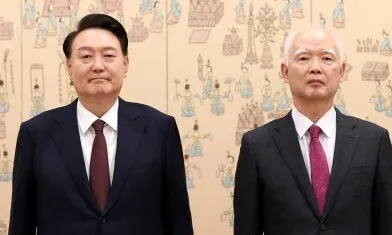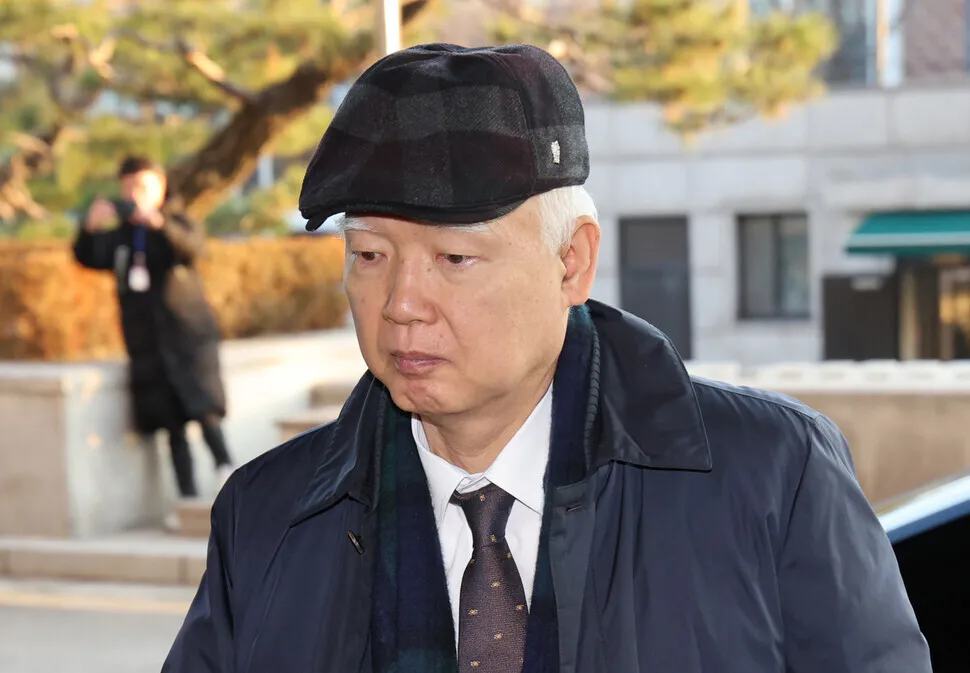hankyoreh
Links to other country sites 다른 나라 사이트 링크
Yoon-appointed justice to preside over president’s impeachment trial

Cheong Hyung-sik, a Constitutional Court justice appointed by President Yoon Suk-yeol, will reportedly act as the presiding judge for the president’s impeachment trial. Cheong is the brother-in-law of Park Sun-young, who was appointed as the chair of the Truth and Reconciliation Commission on Dec. 6, shortly after the insurrection incident on Dec. 3.
The Constitutional Court reportedly used a computerized system to randomly select the presiding judge for the impeachment proceedings on Monday. Alongside Cheong, Justice Lee Mi-son will act as a specially appointed judge tasked with examining evidence other preparations for the proceedings.
Cheong, who is known for his strong conservative leanings, graduated from the 17th class of the Judicial Research and Training Institute. Before being appointed by Yoon as a Constitutional Court justice in December 2023, Cheong served as a judge in the Seoul Central District Court and as a chief judge in the Seoul High Court.
On Dec. 6, three days after his martial law declaration, Yoon appointed Park Sun-young, Cheong’s sister-in-law and former Liberty Forward Party lawmaker (president of Mulmangcho, a private corporation), as the chair of the Truth and Reconciliation Commission. The opposition criticized the appointment as “insurance ahead of the impeachment trial.”

During a press briefing on Monday, the Constitutional Court did not announce the presiding judge for the impeachment trial. The court revealed the presiding judges ahead of the respective impeachment trials of Presidents Roh Moo-hyun in 2004 and Park Geun-hye in 2016, but this time the court stated it would follow “the protocol of nondisclosure.”
When this decision sparked controversy, acting Chief Justice Moon Hyung-bae said, “The decision to not publicly disclose the presiding justice was made according to internal regulations outlined in Article 9, paragraph 1, subparagraph 4 of the ‘Constitutional Court Guidelines for Written Decisions’ regarding the public disclosure of information pertaining to a public institution. There were no grounds for exceptionalism in this case.”
Moon said the preliminary hearing would be delegated jointly to two justices, and the hearings thereafter would take place under the authority of the presiding justice and would be subject to the review of all presiding Constitutional Court justices.
“The issue of who the presiding judge, therefore, does not influence the speed or direction of the trial,” Moon said.
By Oh Yeon-seo, staff reporter
Please direct questions or comments to [english@hani.co.kr]

Editorial・opinion
![[Editorial] Korea, US need a ‘gentlemen’s agreement’ on what job creation entails [Editorial] Korea, US need a ‘gentlemen’s agreement’ on what job creation entails](https://flexible.img.hani.co.kr/flexible/normal/482/289/imgdb/original/2025/0911/9717575780802784.jpg) [Editorial] Korea, US need a ‘gentlemen’s agreement’ on what job creation entails
[Editorial] Korea, US need a ‘gentlemen’s agreement’ on what job creation entails![[Column] Why MAGA has its eyes set on Korea [Column] Why MAGA has its eyes set on Korea](https://flexible.img.hani.co.kr/flexible/normal/500/300/imgdb/original/2025/0911/2117575773523233.jpg) [Column] Why MAGA has its eyes set on Korea
[Column] Why MAGA has its eyes set on Korea- [Column] Lee still has his work cut out for him after summit with Trump
- [Editorial] Is this any way for the US to treat an ally?
- [Column] Lee’s difficult task of striking a balance on Japan
- [Editorial] Multipolar era means Seoul must broaden its diplomacy
- [Column] North and South Korea are no longer pawns in US-China-Russia relations
- [Column] Who we fail when we oversimplify the ‘comfort women’ issue
- [Column] How Seoul can navigate its security in a shifting world order
- [Editorial] Former first lady’s indictment is consequence of her acting as though she were president
Most viewed articles
- 1Seoul says US must fix its visa system if it wants Korea’s investments
- 2MAGA’s traveling circus comes to Korea
- 3[Column] Why MAGA has its eyes set on Korea
- 4Korean workers’ return held up by Trump’s proposal that they stay in US, Seoul says
- 5A week after ICE raid, 300+ Koreans head to airport upon release
- 6Trump ordered smooth reentry to US for Koreans detained in ICE raid, Seoul says
- 7Construction hits delays at 4 LG Energy battery plants in US after Georgia raid
- 8[Editorial] Korea, US need a ‘gentlemen’s agreement’ on what job creation entails
- 9North Korea said to have exposed numerous US spies after botched 2019 SEAL mission
- 10Korean automakers vexed by 25% tariff as Japanese competitors granted lower rate